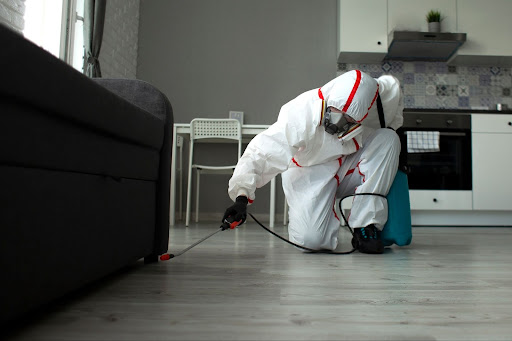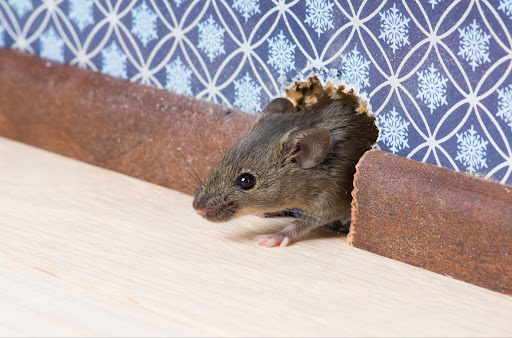Pest control services are essential to keeping your home safe, especially when it comes to pest control in apartments. These unwanted visitors, ranging from rodents to insects and bed bugs, have the potential to disrupt your peace, jeopardize your health, and inflict damage on your living space. This is where the crucial role of pest control comes into play.
Pest control is not merely an option; it’s an essential aspect of apartment maintenance. These uninvited critters are not only a nuisance; they can pose serious health hazards. Some pests trigger allergies or exacerbate respiratory problems, making it imperative to keep them at bay.
Beyond health concerns, pests can inflict substantial damage to your apartment. Termites, for example, can silently feast on wooden structures, causing structural problems that can be costly to repair.
We’re here to help you navigate the often-confusing world of pest control in apartments. More specifically, we aim to provide you with clear guidance on how often you should schedule pest control services.
By the end of this blog, you’ll have a better understanding of the factors that influence the need for pest control, the different scheduling options available, and signs that indicate it’s time to call in the professionals.
Armed with this knowledge, you’ll be better equipped to make informed decisions about the pest control strategy that best suits your apartment’s unique circumstances.

Understanding the Need for Regular Pest Control in Apartments
Pests, those uninvited and unwelcome guests, can take various forms in apartment living. From sneaky rodents to resilient insects and the notorious bed bugs, it’s essential to be well-versed in the types of critters that might set up camp in your living space.
- Rodents: Mice and rats are notorious apartment invaders. They can squeeze through tiny openings and, once inside, wreak havoc by gnawing on wires, contaminating food, and leaving behind droppings.
- Insects: Cockroaches, ants, flies, and mosquitoes are among the most common insect pests in apartments. They can quickly multiply and become a persistent nuisance.
- Bed Bugs: These tiny, blood-sucking pests are experts at hiding in cracks and crevices, emerging at night to feed on sleeping residents. Their bites can lead to itchy welts and sleep disturbances.
Now that we’ve met our unwanted guests, it’s crucial to understand the potential health risks they pose:
- Disease Transmission: Rodents, such as mice and rats, are carriers of diseases like Hantavirus and Salmonella. Their droppings and urine can contaminate surfaces and food, putting residents at risk of infection.
- Allergies and Respiratory Issues: Cockroaches and certain types of insects can trigger allergies and exacerbate respiratory problems, particularly in individuals with asthma or allergies.
- Vector-Borne Diseases: Insects like mosquitoes and ticks can transmit serious diseases, including West Nile virus, Lyme disease, and Zika virus.
Pests aren’t just a health concern; they also inflict damage on your apartment:
- Structural Damage: Termites are notorious for silently devouring wooden structures, causing significant damage over time. Repairing this structural harm is a costly endeavor.
- Property Contamination: Pests like ants and rodents can contaminate your food supply, leading to foodborne illnesses. They can also leave behind unsightly droppings and odors throughout your apartment.
- Sleep Disruption: Bed bugs are notorious for their stealthy nighttime feeding habits. An infestation can lead to sleepless nights and physical discomfort.
Factors Influencing Pest Control Frequency
Determining how often you should schedule pest control services in your apartment isn’t a one-size-fits-all decision. Several factors come into play, each influencing the optimal frequency for pest management.
Apartment Location
Apartments in densely populated urban areas may be more susceptible to pests due to the proximity of neighboring buildings, restaurants, and other potential sources of infestations. If you reside in the heart of a city, you might need more frequent pest control visits to prevent issues.
Suburban apartments typically have a bit more breathing room, but they are not immune to pest problems. Depending on your specific suburban location, you may still need regular pest control, especially if you’re close to wooded areas or bodies of water, which can attract certain pests.
Apartments in rural areas may encounter unique pest challenges, such as wildlife intrusion. The frequency of pest control in rural apartments often depends on the local environment and the specific pests common to the region.
Climate and Seasonal Changes
Areas with warm, humid climates tend to experience more year-round pest activity. In such regions, pests like cockroaches, ants, and mosquitoes thrive, necessitating more frequent pest control visits.
Many pests become more active during specific seasons. For example, rodents may seek shelter indoors during colder months. Understanding the seasonal patterns of pests in your area can help you determine when to schedule preventive treatments.
Building Type and Age
The construction and design of your apartment building can affect its vulnerability to pests. Older buildings may have more structural vulnerabilities that pests can exploit, making regular pest control more critical.
Your specific unit within the building can also impact your pest risk. Ground-floor apartments, for instance, are often more accessible to pests like rodents and ants, requiring more frequent pest control measures.
Previous Pest Issues
If your apartment or the building as a whole has a history of pest problems, it’s wise to be proactive and schedule pest control services more frequently. Past infestations can indicate underlying conditions that make your apartment more susceptible.
After an initial pest control treatment, follow-up visits may be necessary to ensure the infestation is completely eradicated. These follow-up appointments should be scheduled as recommended by your pest control professional.

General Guidelines for Pest Control Frequency
Now that we understand the factors influencing the need for pest control, let’s dive into the various scheduling options available to apartment residents. Each frequency option has its merits and is suited to different situations.
Monthly Pest Control: When and Why It Might Be Necessary
Monthly pest control is typically reserved for situations where a severe pest issue exists, or for properties with a high risk of constant pest infestations. Monthly treatments provide the most robust defense against pests. This frequency ensures that pests are consistently targeted, preventing population growth and reducing the risk of infestations.
Quarterly Pest Control: Pros and Cons
Quarterly pest control is a popular choice for many apartment residents as it strikes a balance between regular maintenance and cost-effectiveness. Quarterly treatments offer ongoing protection against pests without the expense of monthly services. They are well-suited for apartments in suburban or less densely populated areas with moderate pest pressure.
Annual Pest Control: Situations Where This May Suffice
Annual treatments are a budget-friendly option suitable for apartments with a history of minimal pest issues or those located in regions with low pest activity. They serve as a preventative measure to keep pests at bay.
On-Demand Pest Control: Addressing Specific Issues as They Arise
On-demand pest control is suitable when you notice signs of a pest problem or experience an isolated incident. This approach allows for targeted treatment of specific pests or localized infestations. It’s cost-effective and efficient for addressing pest issues as they emerge.
Regularity is key, but the frequency should align with your specific circumstances and budget. In the next sections, we’ll explore signs that indicate when it’s time for pest control and proactive measures to minimize pest risks in your apartment.
Signs It’s Time for Pest Control
If you’re worried about pests but aren’t sure what to look for, here are some signs to be aware of.
- Pest Droppings: Finding pest droppings in your living spaces is a common infestation sign. Droppings’ size, shape, and location help identify the pest type.
- Unusual Sounds: Pests, especially rodents, make distinct noises like scratching or scurrying. Investigate unusual sounds, particularly at night when pests are active.
- Visible Damage: Check for visible damage caused by pests, such as chewed wires, gnawed wood, or holes in walls or flooring.
- Unusual Odors: Some pests, like rodents, emit unpleasant odors. A mysterious foul or musty smell could indicate a pest infestation.
- Bite Marks or Skin Irritation: Waking up with unexplained bite marks or skin irritation, especially in groups of three (typical of bed bug bites), strongly suggests a pest issue.
- Increased Pest Sightings: Seeing pests during the day, especially in larger numbers, signals an infestation. For instance, daytime cockroach sightings in your kitchen demand action.

Protect Your Apartment With Pink Pest Control
Maintaining a pest-free apartment is not only about reacting to problems as they arise but also about proactive prevention and early detection. By staying vigilant and taking the necessary steps to minimize pest risks, you can create a comfortable and healthy living environment.
For professional pest control services that you can trust, contact Pink Pest Control. With our experienced team, comprehensive treatment plans, and commitment to safety and effectiveness, Pink Pest Control will help you address and prevent pest issues in your apartment.
Call us today at 1-844-PINK-PEST for a free estimate on pest control in apartments and suggestions for the pest control frequency that will work best for you.

